Find Family Recipes in Old Newspapers
Show Notes: Learn how to find old family recipes in newspapers. Lisa Louise Cooke and her guest Jenny Ashcraft of Newspapers.com show you how to find old recipes and discover what newspapers can tell you about the food your ancestors cooked and ate. Genealogy & family history has never tasted so good!
Watch the Video:
Show Notes
Get 20% off Newspapers.com. Click here and use coupon code genealogygems
Do you have a family recipe that has been passed down for generations? Or maybe you wish you could find a family recipe that has been lost?
Jenny Ashcraft of Newspapers.com is back and we’re talking about food and family history. How to find long-lost family recipes in Newspapers, how history has impacted the food your family ate and the recipes they used, and food trends over the decades.
You’ll learn some of our favorite search strategies, and who knows, you just might discover a recipe from your family in the papers!
Food really evokes powerful memories, brings people together, and strengthens family history ties among both the living and the dead.
Families have gathered around the table forever, and family recipes evoke powerful memories. Have you ever smelled something baking or had a little taste of something, and the memories just flood back? Food is usually a part of family gatherings, and it’s a way to strengthen traditions and express love.
Why did newspapers publish recipes?
In the days before the internet, newspapers were a popular way for home cooks to share recipes. Most home cooks had a repertoire of recipes they cooked often. Newspaper recipes were a way to try something new. Recipe exchanges in the newspapers were popular, with cooks both asking for recipes and sharing one of their favorites.
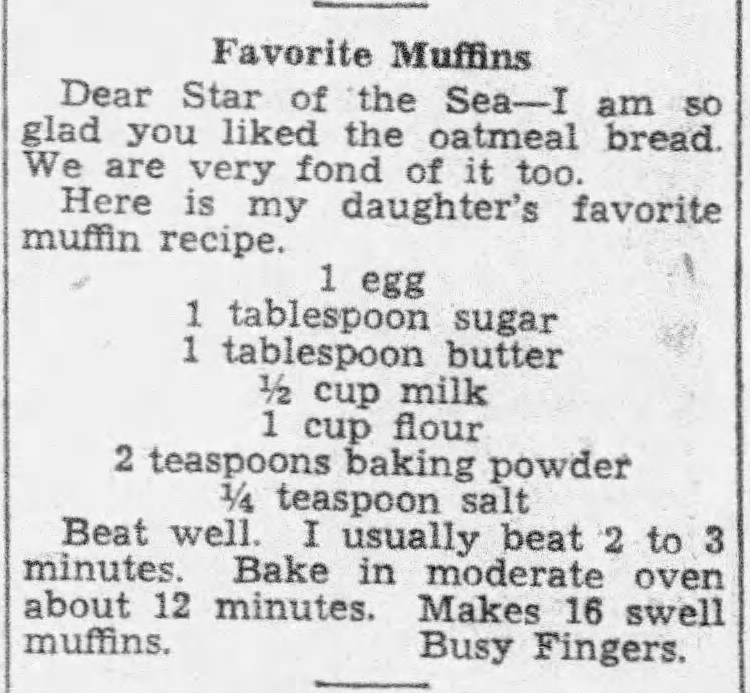
Courtesy of Newspapers.com
Sometimes newspapers called for readers to submit recipes, and they would choose a few to publish. Other times the paper published the recipes of contest winners. Papers also published brand recipes like this 1928 recipe for brownies using Borden Magnolia Sweetened and Condensed milk. https://www.newspapers.com/clip/106800978/borden-sweet-and-condensed-milk-brownie/. Many newspapers also had official food columns. Just the other day, I went to my cookbook to find a recipe and noticed that I still have all kinds of newspaper clippings in my own recipe collection.
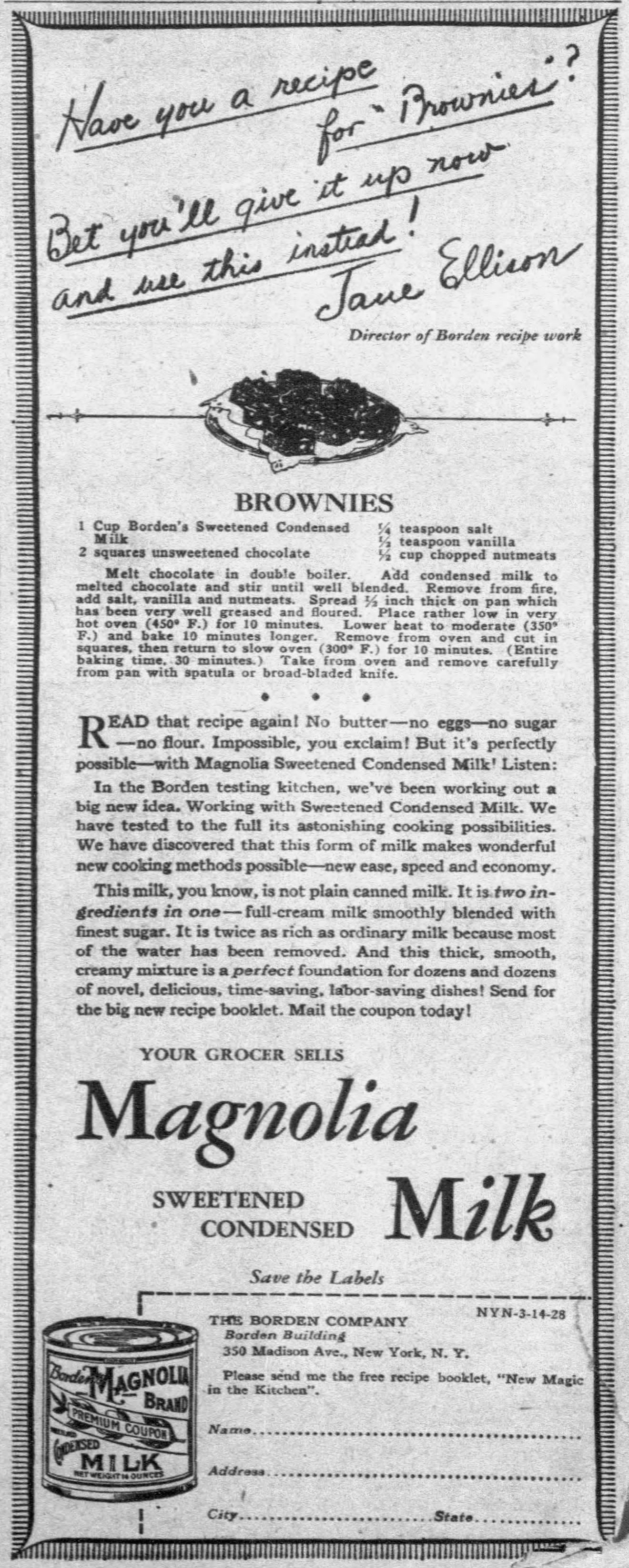
Courtesy of Newspapers.com
How to Find Family Recipes in Newspapers
Finding a recipe from one of your ancestors is so exciting! Let me share an example of how one of our customers discovered his grandmother’s recipe for kolaches.
In July, we published a Newspapers.com blog about finding your ancestors in the newspaper Society Pages. Maurice, one of our readers, commented that he searched the society pages to see if his grandmother was mentioned. Initially, he didn’t have success. However, as he continued to search, he found his grandmother listed under her husband’s name, Mrs. Frank Vonasek. This was 1932, and it was common for women to appear in the paper using their husbands’ names.
Maurice found his grandmother in several articles. In one, she shared her recipe for kolaches. Maurice said it was such a thrill to find this family recipe and just about brought tears to his eyes. Notice how this recipe says cook in a hot oven (usually 375-400) In 1932, some cooks were still using ovens heated with wood or coal. Ovens with temperature settings were invented around 1915, but not everyone had one. Without the ability to set your oven to a designated temperature, cooks became very adept at determining if the oven had reached the desired temperature.

Courtesy of Newspapers.com
It was a thrill for Maurice to find his grandma’s recipe, but what if you can’t find your ancestor’s recipe? Chances are, you will find one very similar. Let me share a personal example.
My family loves fresh English peas that come on every spring. We go to the fruit stand or farmer’s market and buy a bag. We just shell them and pop them in our mouths. Every year, my husband talks about the new potatoes and peas in a white sauce that his grandmother used to make.
I decided to search for this recipe on Newspapers.com. I began by searching “new potatoes and peas” in the search box. I started finding some recipes, but none that were similar. Then I added the term, “white sauce”. Again, I wasn’t finding much. I wondered if the white sauce was a cream sauce, so I searched, “New potatoes, peas, and cream”. When I entered those terms, I saw a few recipes that said, “Creamed New Potatoes.” As I looked over the ingredients, I realized I was getting warmer. So, then I started searching for “Creamed New Potatoes and Peas,” and I found tons of recipes.
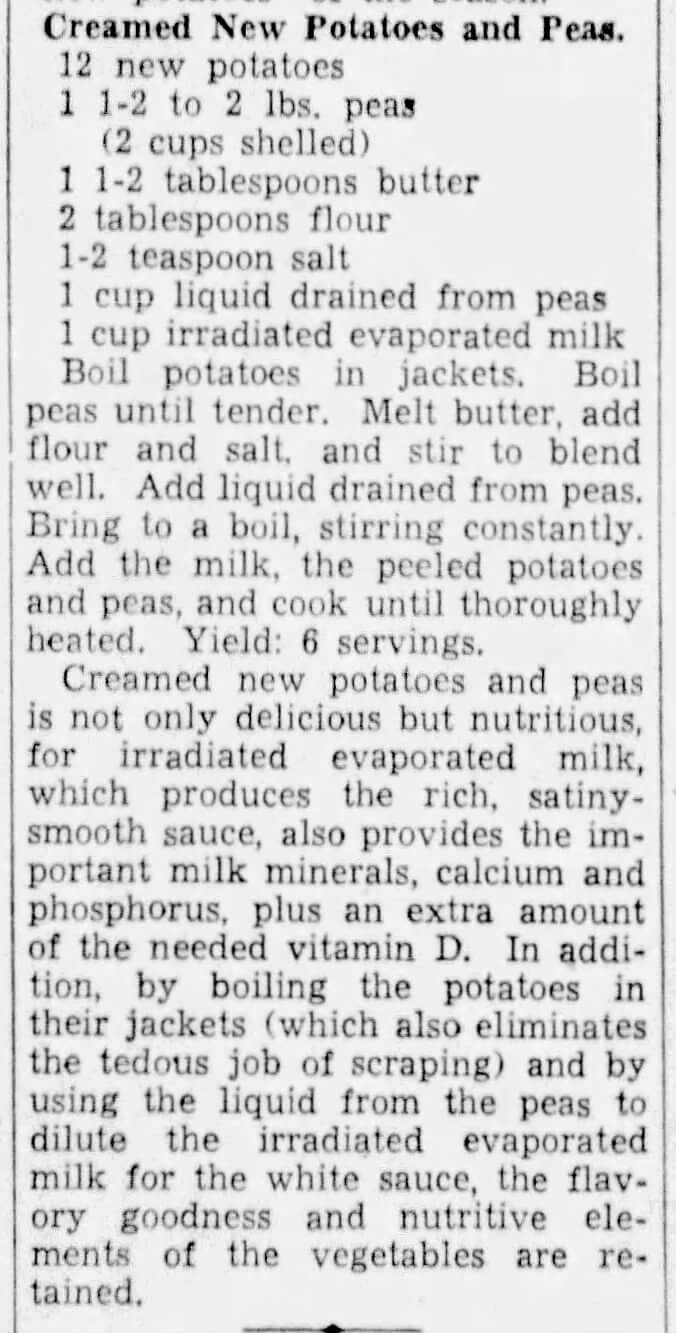
Courtesy of Newspapers.com
It’s not uncommon to find ingredients that are now unusual in historic recipes. For example, in my recipe for Creamed New Potatoes and Peas, one of the ingredients is irradiated evaporated milk. I didn’t know what that was, but after a few moments of searching, I learned that irradiated milk simply meant that the milk was treated with ultraviolet light to get rid of any bacteria.
Learn about history from the food your ancestors cooked
Another thing that impacted the way your ancestors cooked and ate was history. What was happening in the world around them, and how did it impact what they cooked?
Great Depression recipes and food.
One example of this was the Great Depression. How did the Depression impact your family? Was the father out of work? Could they afford to buy food? Where were they living?
Your family’s experience could be dramatically different if they lived in California, where they could grow food in a home garden, or if they lived in the Midwest and were impacted by the Dust Bowl. Growing food was a huge challenge for those people. Residents not only had great difficulty growing food, but they contended with swarms of grasshoppers that destroyed crops.
When you search for recipes during the Depression, you’ll see recipes that used cheaper food and recipes that utilized leftovers, so nothing went to waste.
One example of this is a gelatin loaf. These loaves were used during the Great Depression as a great way to use anything leftover.
For most of us, that is not very appealing. Our Newspapers.com social media team has a lot of fun trying and sharing historic recipes on our social channels. If you are not following us, check us out on Facebook, Instagram, Twitter, and TikTok.
Dandelion greens were another way to get some nutrition. People could go outside and pick dandelions or buy them at the market for a low price. This clipping from 1930 tells readers how to soak the dandelion greens and then the best type of salad dressing to use over them.
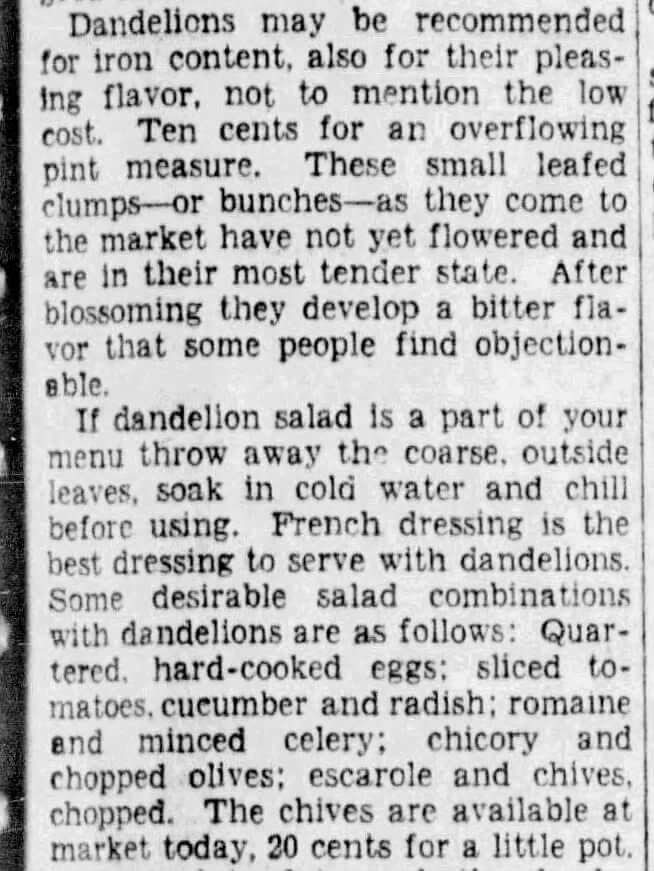
Courtesy of Newspapers.com
What are some other examples of the times impacting food?
Another example of how history impacted the way our ancestors cooked was World War II. Food availability during WWII was different. The world was at war, so some items were hard to get – just like today’s supply chain issues. Foods like sugar, coffee, canned foods, meats, cheese, butter, and oil were rationed. To purchase these items, families presented the grocer with the correct stamps from their government-issued ration books and the money to buy these items.
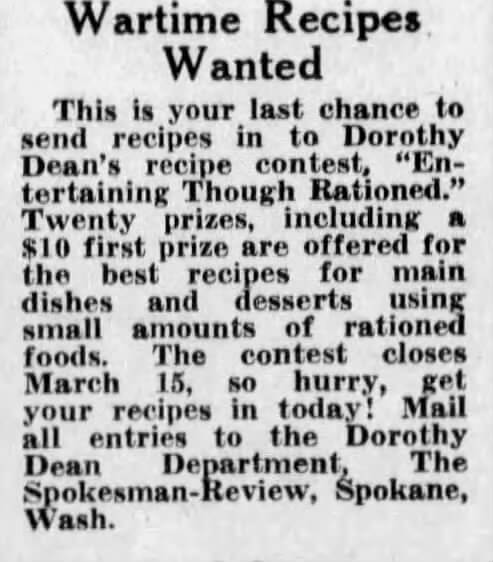
Courtesy of Newspapers.com
Newspapers became a valuable source for home cooks to share ideas and recipes to navigate rationing. Home cooks had to get creative. For example, In WWII a chocolate chip cookie recipe caleld for using honey instead of the hard-to-obtain sugar.
Newspapers sponsored contests and awarded cash prizes for the best wartime recipes using small amounts of rationed food items or substitutes for rationed foods.
Another example of how rationing impacted cooking during WWII was cooking with meat. Nicer cuts of meats required a higher number of ration points, but organ meats like kidneys, liver, and heart had relatively low point values. So, we start to see a lot of recipes using these low point value meats. Maybe this is why your grandparents ate liver and onions.
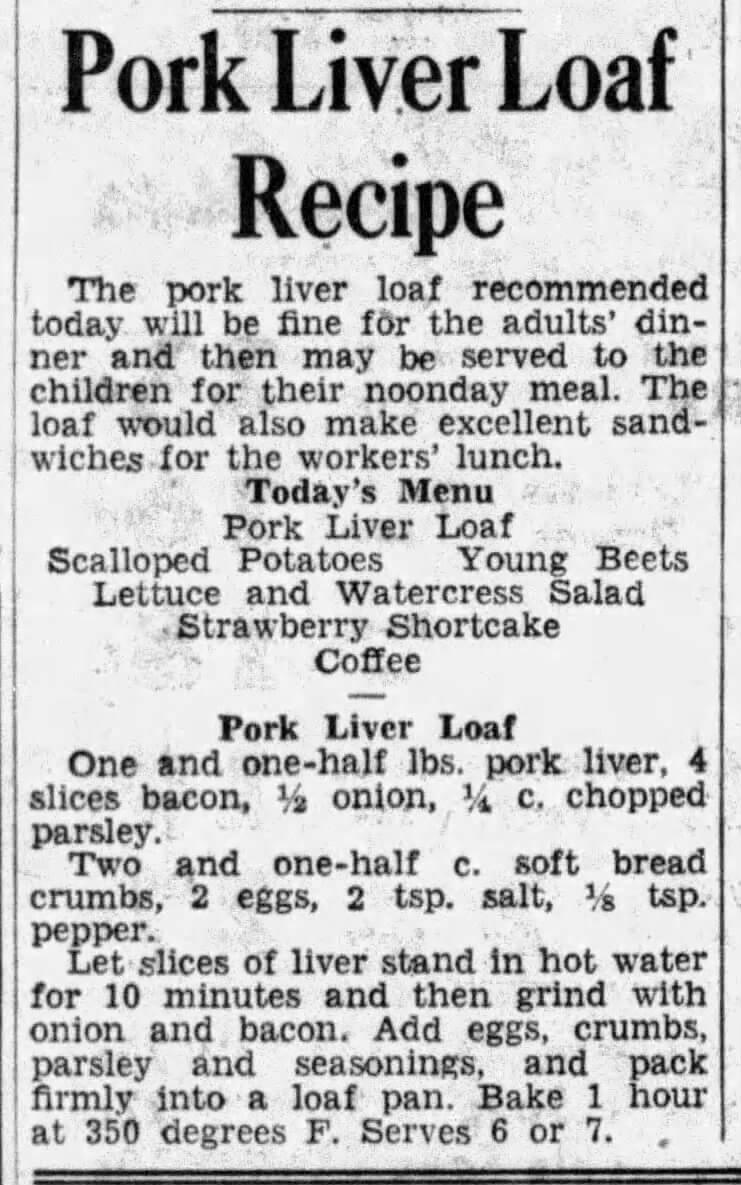
Courtesy of Newspapers.com
Fresh fruit and veggies were not rationed, but canned, bottled, and frozen food was. WWII recipes focused on high nutritional value to make sure people were still getting vitamins, minerals, protein, and energy even though their diets may have changed due to rationing.
1950s and 1960s Recipes and Food Trends
There have always been food fads and trends, and as we move out of the WWII era, we see evidence of this.
For example, in the 1950s, we see lots of recipes with canned pineapple. During the 1950s and the 1960s, many Americans loved anything tropical, and canned pineapple represented the islands. Here’s a reader-submitted recipe for pineapple cookies in 1954:
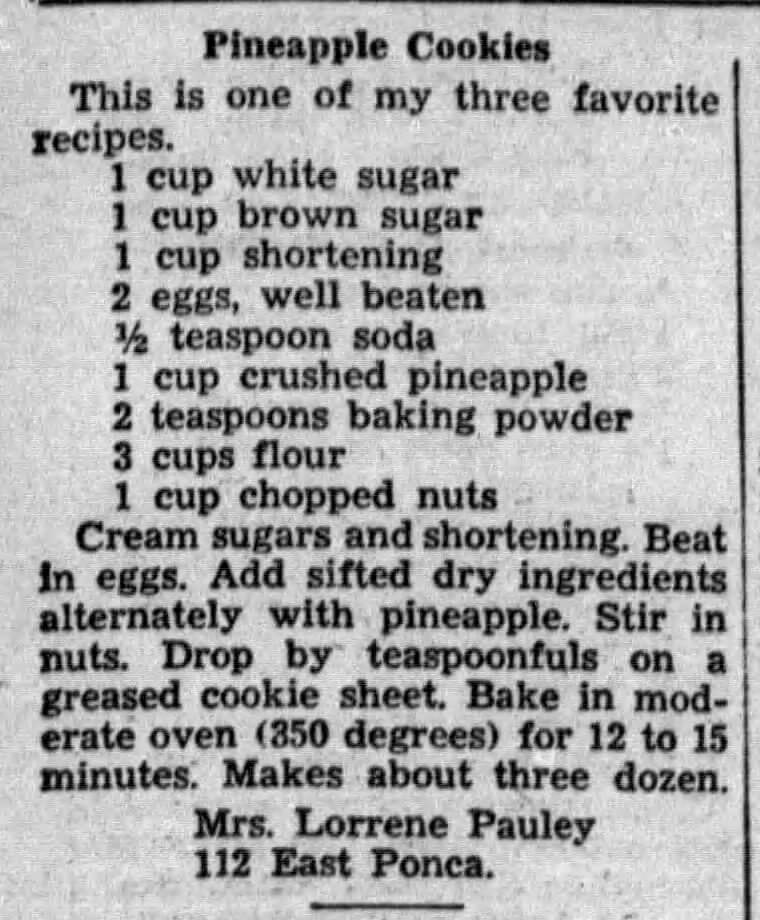
Courtesy of Newspapers.com
Bourbon balls were also very popular in the 1950s. Apparently, they are still popular today because this is one of our viewers’ favorite recipe posts.
Pimientos were big in the 1960s, and you’ll see that manifest in recipes:

Courtesy of Newspapers.com
The 1980s brought an excess of cheese. Starting in WWII, processed cheese was a commodity that was controlled on a federal level. The cheese was stockpiled in warehouses around the country, and by the early 1980s, there were more than 2 lbs. of cheese stored for every person living in the United States.
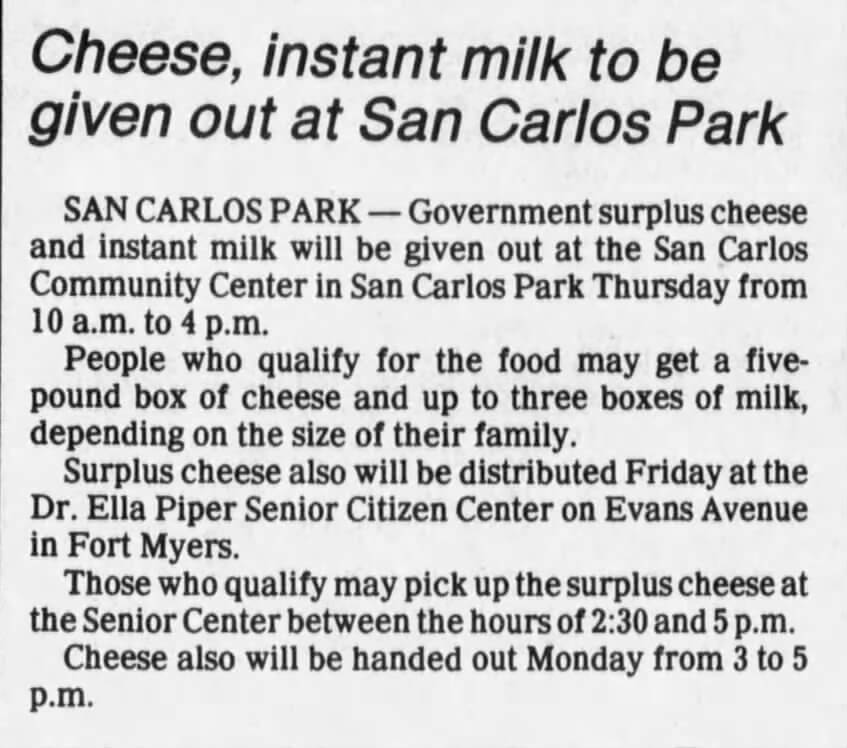
Courtesy of Newspapers.com
In 1981, President Ronald Reagan signed the Agricultural and Food Act and began distributing all the stockpiled cheese. As a result, in the 1980s, we start to see a plethora of recipes to use all of that processed cheese.
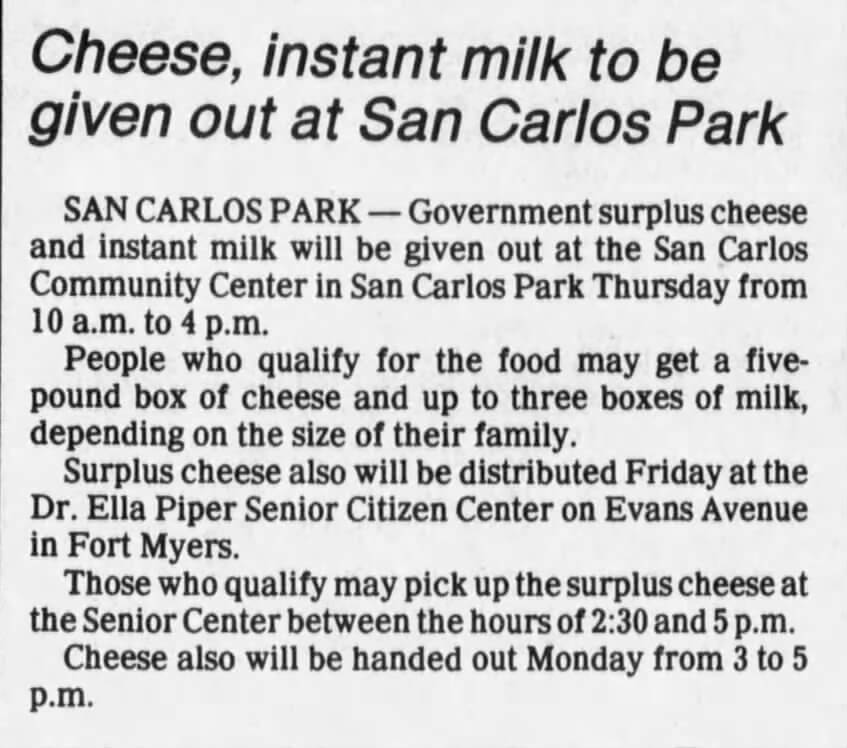
Courtesy of Newspapers.com
How recipes changed over the years
Once you find your ancestor’s recipe in the paper or just one you think looks interesting, it’s important to know that there may be differences in historic recipes and recipes today.
Some ingredients or brands are no longer available. Here is a 1918 ad for a product called Egg-O. It was a common ingredient and an egg substitute.
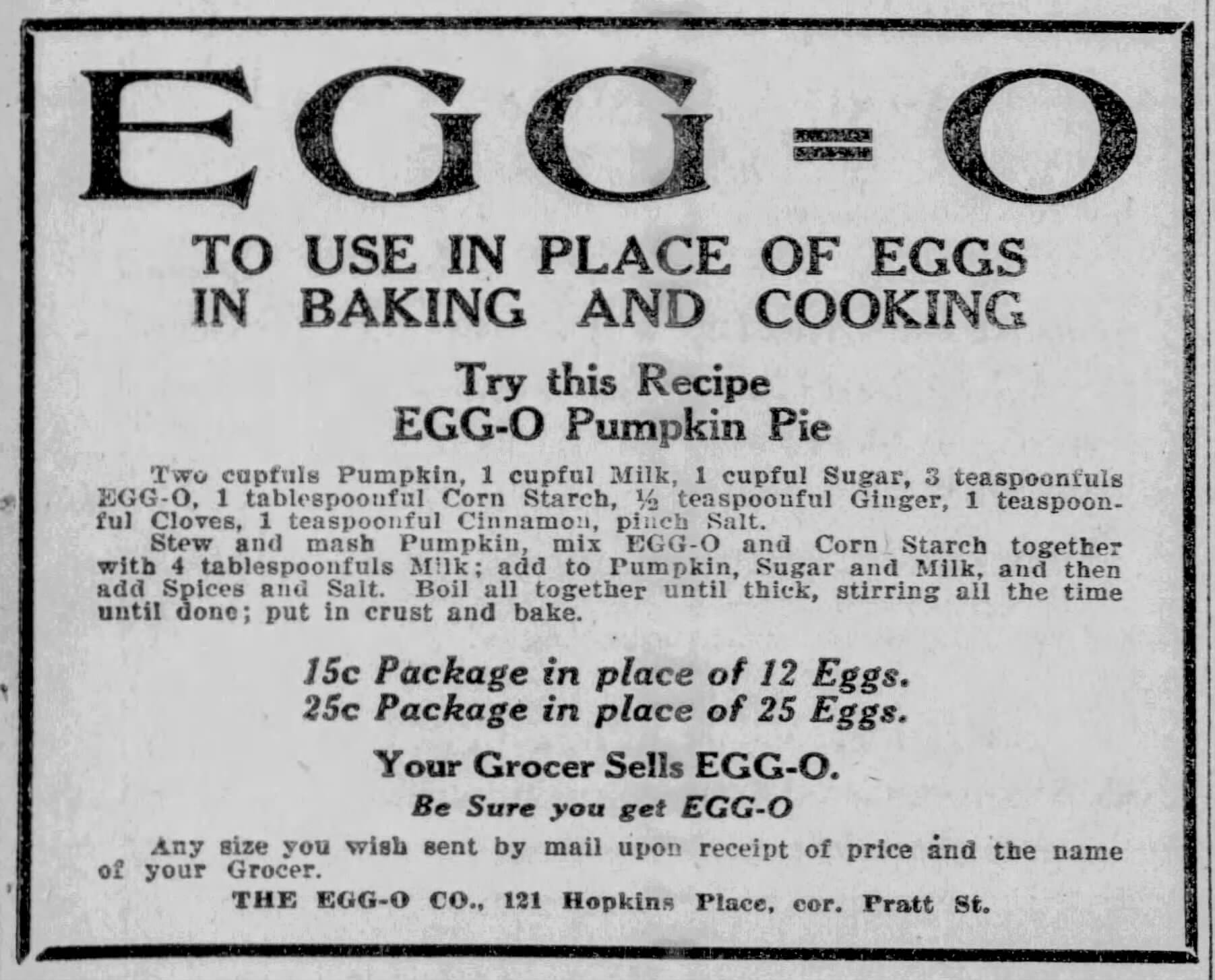
Courtesy of Newspapers.com
Package sizes are different. An example of this is bakers’ chocolate.
The way recipes were written can be different. Some old-time recipes used hyphens instead of slashes for fractions. So, it may look like 2-3 cups of sugar, but it is really 2/3 cup of sugar.
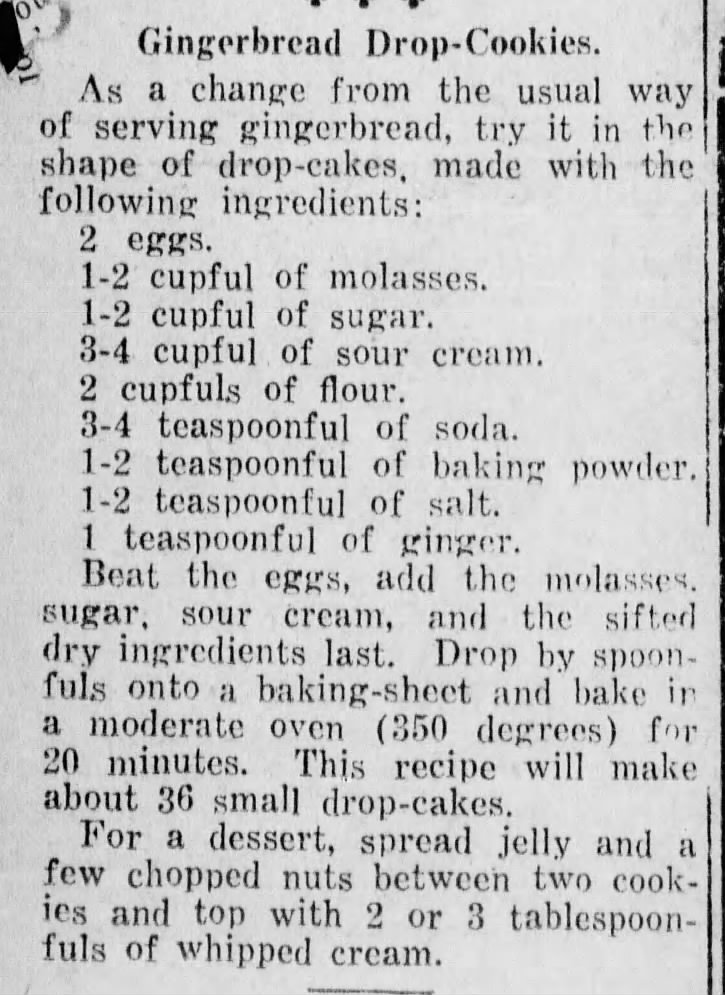
Courtesy of Newspapers.com. Dashes mean the same as a slash. They are fractions.
Recipes also might taste different today. If you have your grandmother’s banana bread recipe, it was likely made using a different variety of bananas called Gros Michel. In the 1950s, a disease destroyed wiped out the banana crop, and farmers started growing a variety of bananas called Cavendish. Apparently, the Gross Michel bananas were better, so your banana bread will never taste quite the same.
Many old recipes called for sour milk. Before milk was pasteurized, it soured very quickly. When you combined the sour milk with baking soda, it created a chemical reaction that was just like using baking powder. The reaction also removed the sour taste from the milk. My sugar cookie recipe calls for sour milk, and I add a bit of lemon juice or vinegar to the regular milk.
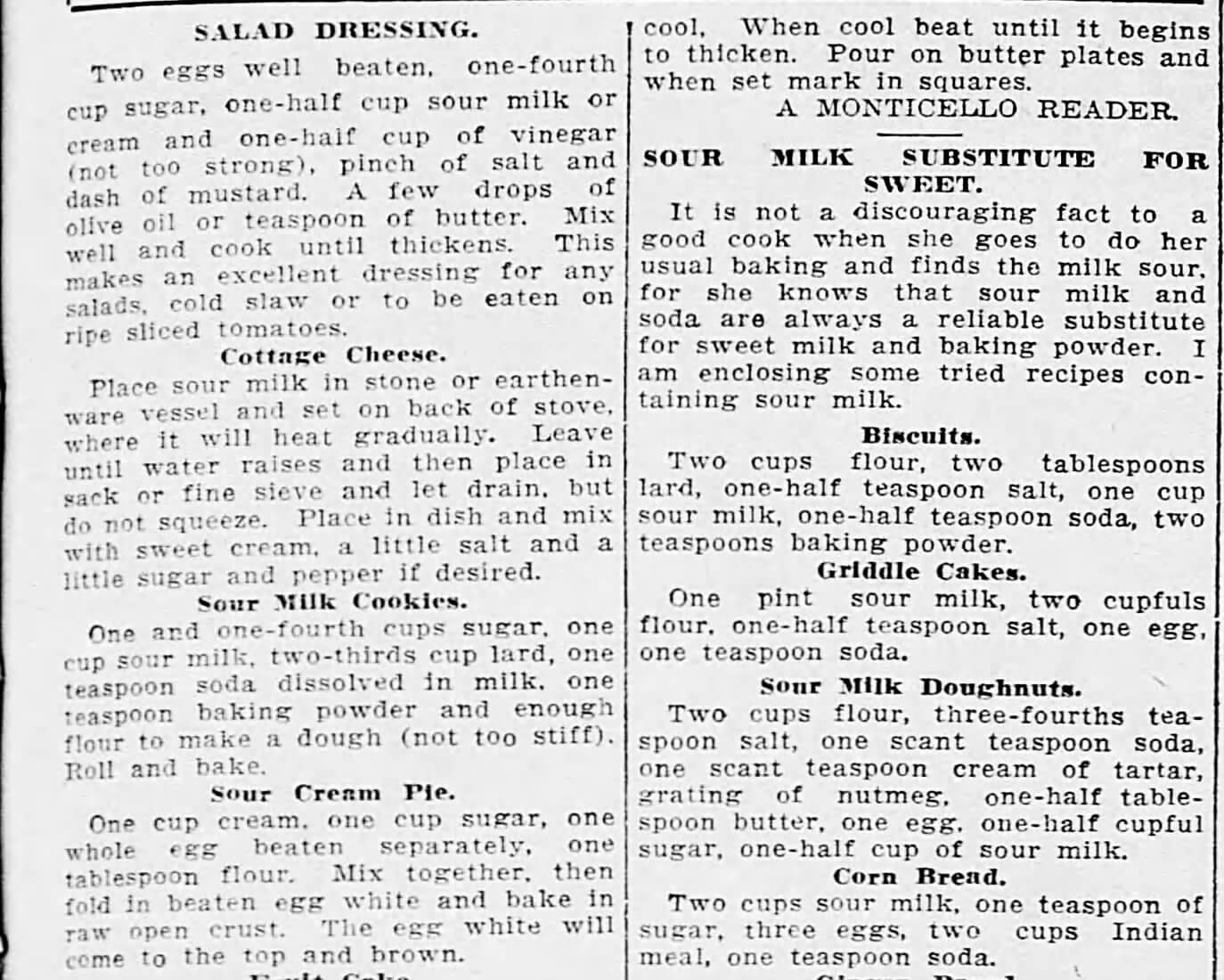
Uses for Sour Milk in cooking. Courtesy of Newspapers.com
Exact measurements may not be used in older recipes. Standardized measurements didn’t come out until the Victorian era and even then they took a while to catch on, so up until the 1940s or so, it’s not uncommon to see a recipe that calls for terms like a teacup of sugar, butter the size of an egg, or a gill of milk (which was about 4 oz).
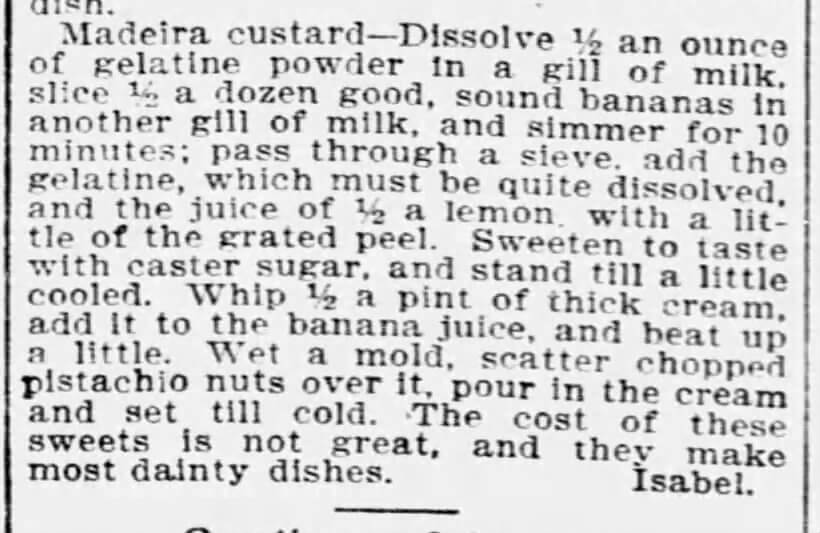
Courtesy of Newspapers.com
Recipes were often in the paper in paragraph format, not the column format we are used to today.
Start finding recipes in old newspapers
Take the opportunity to ask your parents and grandparents about the types of foods they prepared and ate. Start a family conversation. We can learn so much from these oral histories.
If you’ve been lamenting that long-lost family recipe, you’ll probably find it on Newspapers.com. We have nearly 775 million pages of newspapers dating back to the 1690s. You can search papers from every state and international papers from the UK, Canada, Australia, Ireland, and Panama.
Get 20% off Newspapers.com. Click here and use coupon code genealogygems
Resources
Downloadable ad-free Show Notes handout for Premium Members.


